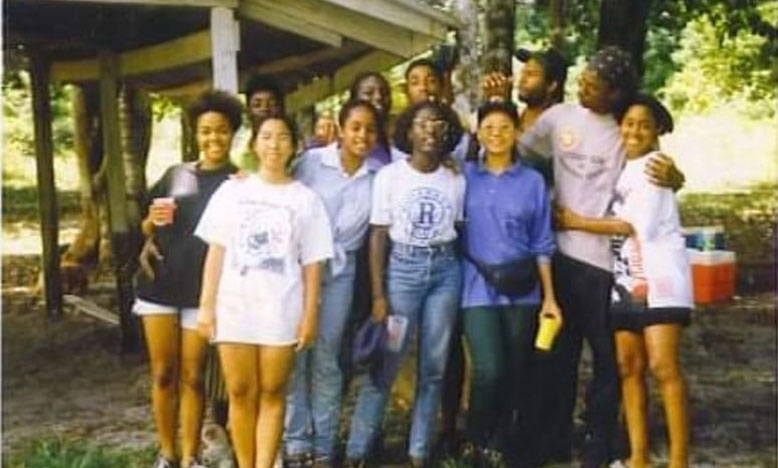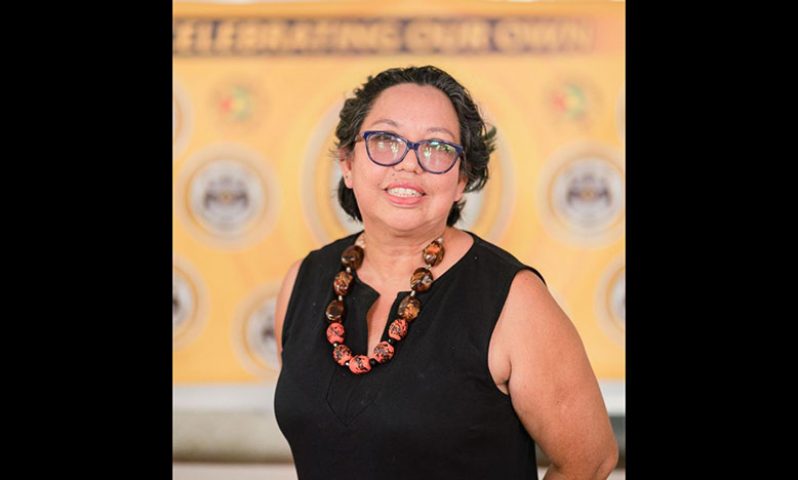– Guyanese conservationist on a mission
Melanie McTurk believes strongly in preserving Indigenous cultural heritage and protecting and conserving the natural habitats in the environment. Her wholehearted commitment to embracing and advancing sustainable tourism across the country’s Rupununi region that benefits Indigenous people and communities has paved the way for her to build a prolific career in environmental conservation in Guyana.
It is no surprise that McTurk is attracted to cultural and biological diversity and she devotes her time and efforts to making an impact in the conservation and tourism sectors. Etched in her mind from childhood are the days she spent watching in excitement at the caimans and snakes that roamed in her family’s backyard at their home in Meadow Brook Gardens, Georgetown (Demerara-Mahaica). This admiration of nature’s beauty fueled by a love for national songs she would sing in school, such as ‘Born in the land of the Mighty Roraima’ nurtured McTurk’s deep-seethed interest in promoting the wonders of Guyana and in time, she participated in the Youth Challenge International (YCI) programme during the early 1990s.

“This gave me the opportunity to explore my own country and that romanticised vision of Guyana that I had as a child became solidified,” said 49-year-old McTurk, Managing Director of Karanambu Lodge, Region Nine (Upper Takutu-Upper Essequibo) and the current President of Visit Rupununi. She noted that the YCI programme mobilised Guyanese youths for several community development projects, including fundraising to visit the Rupununi and to engage youths from countries such as Canada, Costa Rica and the Philippines.
“I started to learn more about the vastness of Guyana’s Hinterland and how beautiful it was. I also became fascinated with the diversity of Indigenous culture,” she said. Upon deciding that she wanted to blend her passion for biodiversity with her penchant for chemistry, she decided to pursue a bachelor’s degree in Chemistry at the University of Guyana, and fortunately she soon started working as a chemist at the Iwokrama International Centre for Rainforest Conservation and Development (IICRCD).

At IICRD, McTurk realised the importance of lending a voice and actively safeguarding the tremendous value of the Rupununi’s biodiversity, including its benefits to the pharmaceutical industry that facilitated the production of medical items. McTurk noted that she estimates approximately 10 percent of Guyana’s biodiversity that spans the Iwokrama Rainforest has been explored and tested for chemicals to produce a variety of medical ingredients.
“We had Iwokrama, a wonderful pristine area where we could collect samples, do testing and conduct extensive ethnobotany research to examine what people were using already in Guyana, report on its medical usefulness and test the chemistry to see what was creating that effect,” recalled McTurk of her work as a chemist. She later related jokingly that for this reason, she often recommends Crabwood oil as a remedy for any sickness or ailment because ‘the research and chemistry show that there are active ingredients in it that are genuinely working.’

Continuing with passion and intention in the field of conservation, McTurk presently enjoys exploring the scenic vistas of the Pakaraima mountains to the vast depths of the Iwokrama Rainforest to sustain conservation practices in Indigenous communities, most notably at the Karanambu Lodge in Karanambu, Region Nine and it is one of the oldest ecotourism locations in the country.
Additionally, there was no better way for McTurk to describe a clear and vivid picture of Karanambu during her interview with the Pepperpot Magazine and the historical window that Karanambu creates to the vast Rupununi landscape with magnificent flora and fauna ecosystems, and culturally diverse Indigenous peoples than with one of her favoured books titled ‘Twelve Views in the Interior of Guiana’; that is based on the 1835 to 1839 expedition by Sir Robert Hermann Schomburgk to British Guiana.
“A visit to Karanambu Lodge is similar to taking a trip back in time to the dawn of the 20th century,” she noted.
Karanambu Lodge – Promoting Sustainable Hospitality
In 2002, McTurk along with her husband Edward McTurk, accepted an invitation sent from Edward’s aunt, the late Diane McTurk to visit the Rupununi and take charge of Karanambu Lodge. Diane had devoted much of her life toward wildlife conservation in the region and ensuring that the Karanambu experience embodied the spirit of hospitality and warmth as well as sustainable hospitality, and she knew that McTurk, together with her husband, Edward, can carry on the family legacy.
She shared that her husband is a descendant of Tiny McTurk, who founded Karanambu Lodge in the 1920s. “Karanambu is massive. It’s approximately 117 square miles of land and it’s incredibly isolated,” said McTurk while stating that they built their entire family life in Karanambu. This Indigenous community spans diverse cultures, beliefs, traditions, practices and ways of life passed down from Indigenous generations. As part of her conservation efforts, she also strives to promote an in-depth understanding and respect for Indigenous people and their culture. In her role as a Private Sector Trustee at the National Protection Areas Trust, McTurk aims to promote the importance of protected areas and mitigate existing negative impacts on the environment.

Furthermore, she revealed that Karanambu is one of the most biologically diverse villages in the Rupununi. It is surrounded by the villages Kaimatta and Yakapuri (Upper Takutu-Upper Essequibo) as it sits at the heart of the Rupununi wetlands comprising five different natural habitats, namely: savannahs, bush islands, river ponds and oxbow lakes, gallery, and flood forests.
McTurk went on to explain that Karanambu has two water systems and these are advantageous because it helps to create a rich aquatic ecosystem that is critical to sustaining nature and biodiversity. There is a watershed that exists between Karanambu and Yupukari where the Amazon River from Brazil, during flooding, flows into the Amaku Lake that meets the Essequibo River and other rivers in the territory and this helps to create a blend of nature and biodiversity. “If the Amazon is higher, it will flow into Guyana and it will bring that wonderful biodiversity here and if Guyana is higher, it will carry that wonderful biodiversity there,” she said.
She mentioned that Guyana’s national flower, the Victoria Amazonica, appears naturally in these Rupununi wetlands and Karanambu catchment areas. As a result, Guyana is attributed to have one of most wild collections of the Victoria Amazonica in the world.
Moreover, McTurk explained that Karanambu Lodge features traditional architecture with other elegant details inspired by Indigenous housing in the early 1920s and building materials such as thatch roofs and mud bricks, even though today much of it has been replaced with clay bricks while remnants of the original mudbricks still exist.

With the provision of other essential accommodation amenities to ensure patrons get the best experience of Karanambu, there is a wide range of activities such as hiking, birding, exploring the Iwokrama Rainforest and simply experiencing the joy of sustainable travel to an Indigenous community. Apart from managing Karanambu Lodge, McTurk and her husband lead a charity organisation, Eiripan, to assist families and children living in the Rupununi with essential resources and support.
Visit Rupununi
“Guyana is the most beautiful place on earth and we have a responsibility to share this beauty,” expressed McTurk. She pointed out an existing gap in the Rupununi to promote the destination and its natural wonders to the national and international tourism sectors. McTurk shared that at the time, Conservation International (CI) sponsored a project created by the then Tourism Coordinator of CI, Candace Phillips, centred on creating a regional destination management organisation, Visit Rupununi.
In April 2017, McTurk was elected President of Visit Rupununi and to date, she steers the organisation in keeping with its four main pillars that aim to impact stakeholders in the Rupununi positively. These areas include marketing the businesses and tourism opportunities in the region, building capacity to conduct training in collaboration with the Guyana Tourism Authority (GTA) to enhance talent and skills development as well as fill gaps in technical expertise, facilitating networking ventures with stakeholders that operate businesses from different sectors such as accommodation and hospitality, arts and craft, transportation and recreation and entertainment and advocating for solutions to issues facing people across communities in the Rupununi, particularly on protecting and preserving of the environment and Indigenous cultural heritage.
As a dedicated conservationist, in McTurk’s view, sustainable tourism provides the opportunity for stakeholders in local communities to invest in integrating various tourism products. This encourages the spirit of solidarity that celebrates Guyana as a premier, wildlife-friendly tourism and culturally rich destination. This in turn helps foster national development and allows for the implementation of continuous initiatives centred on conservation and preservation practices within the tourism sector that create job opportunities, encourage economic empowerment and influence local conservation.
“Conservation means protecting our culture and environment. It means protecting what we love,” expressed McTurk.
For more information on Karanambu Lodge, contact Melanie on telephone number: +592 643 – 4110 or visit @karanambulodgegy on Facebook and Instagram.












